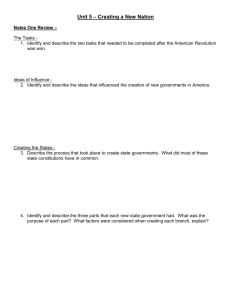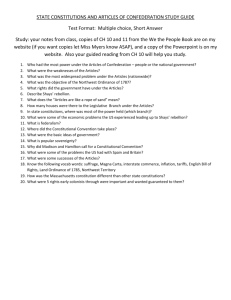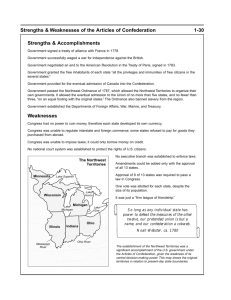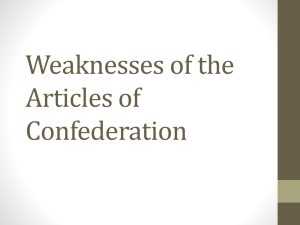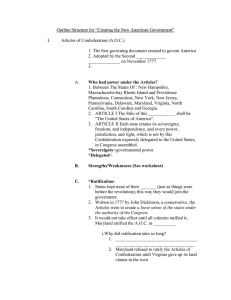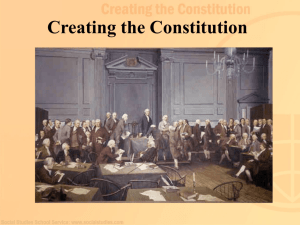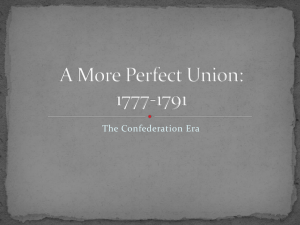7.1 The Articles of Confederation
advertisement
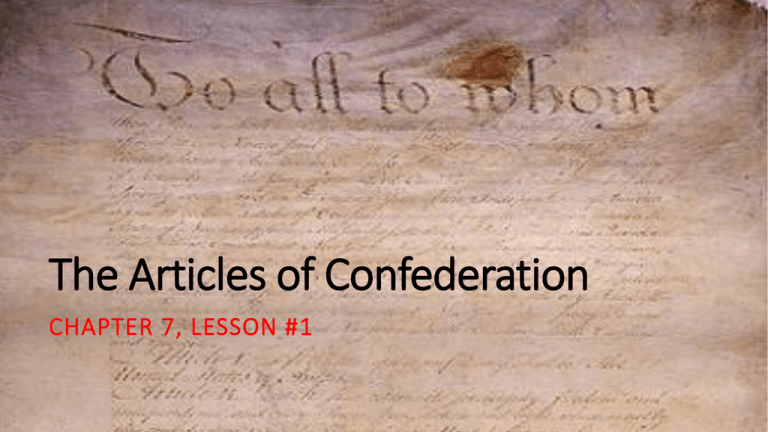
The Articles of Confederation CHAPTER 7, LESSON #1 States Write Constitutions Before declaring independence in 1776: Continental Congress asked all states to organize governments All states were required to create state constitutions 8 states drafted constitutions by end of the year New York and Georgia in 1777 Massachusetts in 1780 Connecticut and Rhode Island used their colonial charters as constitutions Limits on Power After British rule: Americans don’t want too much power in one ruler or group Bicameral: government power split between two groups or houses (ex: governor and legislature) Tried to keep power in the hands of the people Voters choose state legislators Governors’ power was limited Legislatures had more power Tried to make everyone happy but it didn’t work A New Republic New national government: All agreed that a republic form of government be created government in which citizens rule through elected representatives Not all agreed on how much power it should have Most wanted stated to be independent Central government only needed for war or foreign relations The Articles of Confederation November 1777: America’s first constitution is adopted – the Articles of Confederation Established a weak central government States had more power Congress had limited powers conduct foreign affairs maintain armed forces borrow money issue currency The Articles of Confederation (cont’d) Congress could not: regulate trade force citizens to join the army impose taxes No chief executive (president) Congressional committees did day-to-day stuff All states had one vote in Congress regardless of population size The Confederation Government Weak central government: Took 9/13 vote to make a law All 13 states had to agree to change AOC Made it hard to pass any laws Good things: Helped make peace treaty with Britain Expand foreign trade Settle lands in the West Policies for Western Lands No laws for creation of new states: Settlers were living west of Appalachian Mountains. This land was given up by the British after the war. Many wanted to organize their land into states. New laws had to be made on how to settle the land. Create a process to allow territories to become states. The Ordinance of 1785 Ordinance (law) was passed in 1785: Purpose was to set up a process to survey and sell land north of the Ohio River 6m x 6m townships 36 sections of 640 acres Land sold at auction The Northwest Ordinance of 1787 Created the Northwest Territory North of the Ohio River, east of the Mississippi River Divided into smaller territories. When a territory reached 60, 000 people it could apply for statehood. New states got same rights as original 13 states. Settlers got a bill of rights: Trial by jury Freedom of religion Slavery was outlawed First attempt to stop spread of slavery Land Act of 1800 Encouraged people to settle in the Northwest territory Made it easier for people to buy land: Had to purchase 320 acres of land $2 per acre Settlers allowed to pay half up front and pay the rest in 4 yearly payments Problems at Home and Abroad Country had big financials problems! Money printed during war depreciated – lost its value Pubic lost faith in colonial money 146 Continental Dollars = 1 Spanish Silver Dollar! Price of food and other goods soared Led to food riots in many cities Congress was in HUGE debt Still owed revolutionary soldiers money Still owed money to foreign governments Couldn’t collect taxes because of Articles of Confederation!!! Plan for Import Tax Economy faced major economic collapse 1781: Robert Morris proposed an import tax to help raise money This required changing the Articles of Confederation Required all 13 states to vote YES Rhode Island voted NO! TWICE! Congressional debt got worse! Relations with Britain British blocked American ships from the West Indies and other British markets British troops also remained in forts in Great Lakes region. John Adams went to London to discuss issues but they would not talk to him. British claimed the America did not pay back Loyalists. Congress expected the states to do that. States refused to pay and Congress could do nothing. Relations with Spain Spain wanted to stop American expansion west Closed the lower Mississippi river to American shipping This meant Americans in the Northwest Territories could not get goods to market American diplomats reached an agreement with Spain Southern states blocked it and there was nothing Congress could do. The weaknesses of the Articles of Confederation caused a lot of problems and it began to worry many leaders.


